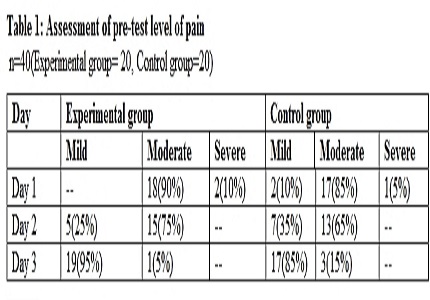Effect of progressive muscle relaxation on post-operative analgesia
Abstract
Background: Postoperative pain begins with surgical trauma, the intensity reduces gradually and ends with tissue recovery. Effective pain management is essential to minimize unnecessary distress and potential complications.
Aim: The study aimed to assess the effect of progressive muscle relaxation technique on post-operative analgesia in patients undergoing abdominal surgery.
Materials and Methods: Evaluative research approach, quasi experimental time series design and simple random sampling technique were used to select 20 samples in experimental and control group respectively.
Results: Progressive muscle relaxation was the only influencing factor on reducing pain on 1st and 2nd post-operative day and no significant association was found between the research variables and level of pain. Mean arterial pressure was positively correlated with level of pain (<0.05).
Conclusion: Progressive muscle relaxation technique was effective in reducing post-operative pain and the results of this study can be incorporated in surgical units for proper management of post-operative analgesia.
Downloads
References
Lewis, Heitkemper, Dirksen, O’Brien, Bucher. Medical-Surgical Nursing. Elsevier, a division of Reed Elsevier India Pvt. Ltd. 2011, pages: 109.
Mackintosh C. Assessment and management of patients with post-operative pain. Nursing Standard 2007;22:5, 49-55. Available from http://www.uptodate.com/contents/management-of-postoperative-pain
http://spradlinbodyworks.wordpress.com/2013/10/14/abdominal-surgery-statistics/
Arslan & Çelebioğl. Level of post-operative pain after abdominal surgery. J Res Med Sci. 2013; 18: 172–177. Available from: http://www.medscape.com/viewarticle/759618_2.
McCaffery M, Pasero C. Teaching patients to use a numerical pain-rating scale. Am J Nurs. 1999 Dec;99(12):22.
Chanif C, Wongchan P, Wimonrat C. Acute Postoperative Pain of Indonesian Patients after Abdominal Surgery. medianurs. 2012;2: 409- 420. Available from http://ejournal.undip.ac.id/index.php/medianers/article/view/3986
Jeffrey L. A, Connie C, Mehta S.S, and Tong J. Gan. Postoperative Pain Experience: Results from a National Survey Suggest Postoperative Pain Continues to Be Undermanaged. Anesth Analg 2003;97:534–40. Available from http://clinicaldepartments.musc.edu/medicine/education/residency/Acute%20pain%20Apfelbaum.pdf
Topcu SY, Findik UY. Effect of relaxation exercises on controlling postoperative pain. Pain Manag Nurs. 2012 Mar;13(1):11-7. doi: https://doi.org/10.1016/j.pmn.2010.07.006. Epub 2010 Sep 21.
Good M, Stanton-Hicks M, Grass JA, Cranston Anderson G, Choi C, Schoolmeesters LJ, Salman A. Relief of postoperative pain with jaw relaxation, music and their combination. ) Pain. 1999 May;81(1-2):163-72.



 OAI - Open Archives Initiative
OAI - Open Archives Initiative


